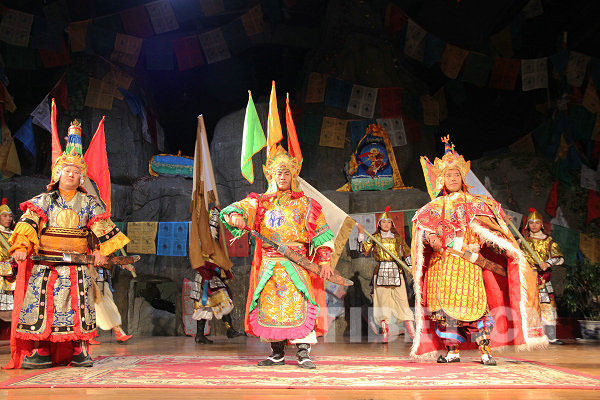
Inheritors of national intangible cultural heritage chant stories of King Gesar, the world's longest epic, in Lhasa, capital of southwest China's Tibet Autonomous Region, Nov. 1, 2013. [Photo/China Tibet Online]
LHASA, Tibet, Nov. 4, 2013 (China Tibet Online)Renowned god-taught ballad singers performed story-telling of King Gesar in Lhasa, Nov. 1, 2013, in a move to bring the ancient Tibetan art closer to local residents.
Intangible Cultural inheritors of national and regional levels chant excellent stories of King Gesar during the event, the first of its kind held as a performance publicly, which was co-organized by the Mass Gesar Association of Nagqu Cultural Bureau and several cultural media companies in Lhasa.
"The ballad singers used to chant Gesar stories in rural areas, which are now showed on stage", said 45-year-old Tsering Dradul, an inheritor of national intangible cultural heritage, who has been chanting Gesar stories for over 30 years.
"Nowadays, people of various ethnic groups can experience the charm of King Gesar art by themselves. I am very proud of being an inheritor of Gesar, and I hope it will be more widely known."
King Gesar, the world's longest epic, is a ballad about a half-human, half-god Tibetan king in the 11th Century who conquered the devils of other tribes and sought to help ordinary people. With more than 120 episodes, King Gesar is considered the crowning masterpiece of Tibetan folk literature.
In 2009, Gesar was inscribed into the intangible cultural heritage list of UNESCO. Besides the Tibetan region, the King Gesar stories are also popular today among ethnic minorities in China including the Mongolian, Tu, Sugu and Naxi peoples.
